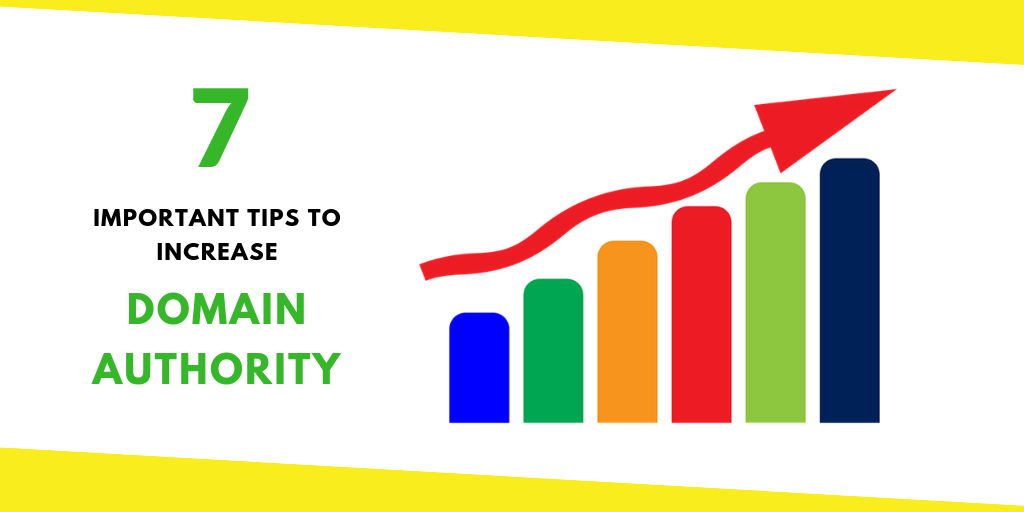7 Important Tips To Increase Domain Authority [DA] – (Proven Tips)
This post was last updated on July 12th, 2023

When it comes to search engine rankings, there are some websites that always top the results page and this is an outcome of their website’s domain authority. It is basically a number or metric that reflects the authority of your website.
The higher the domain authority, the greater are the chances of attaining higher rank on the search engine results pages (SERPs) and getting more traffic. Developed by Moz, the domain authority metric ranks domains based on numerous determinants and rates them from 0 to 100. The metric is being largely used to measure the relevance of websites and webpages.
Contents
ToggleHow Domain Authority Works?
The domain authority metric predicts the website ranking on search engines but it does not share similarities with the ranking score used by Google, which is actually capable of influencing your website’s rankings. However, the domain authority takes into consideration all the possible factors that affect the search engine rankings by using the Google ranking algorithm and then renders a score to domains to be utilised only for comparison purposes.
Therefore, domain authority depends upon the data that Moz has collected about your domain but is not necessarily accurate in comparison to Google rankings. It is hence, possible to have high ranking in Google but low domain authority. Here are some important points about domain authority that you must know in order to reap full advantage of it:
* A website that is subject to Google penalty has to face low rankings. But domain authority does not take into account the Google penalty and hence, the website may still enjoy high domain authority.
* Changing your website’s domain authority score to witness an increase in domain authority instantly is not easy.
* While the Google’s ranking algorithm is dependent on countless factors, the domain authority subjects a website to only 40 factors.
* Being based on the logarithmic scale, you can improve your website’s domain authority score from 20 to 30 but taking it from 70 to 80 can be quite arduous. As your score gets higher, the difficult it gets to improve the score.
* The domain authority score does not remain static, which is why, it is not the right metric for improving SEO performance but it is an efficient website metric that can be used for domain comparison purposes.
Moz makes uses of a number of factors for calculating domain authority like the quality and importance of incoming links, the website content quality, the number of incoming links leading to your website, social signals indicating popularity of your website in social media, the SEO performance of your website and so on.
Here are 7 important steps to increase your domain authority that will help your website climb the SEO rankings and bring in some quality traffic:-
1. Focus On Your Off-Page SEO
One of the most important metrics is your link profile as clean and strong profiles enjoy high domain authority score. Websites having incoming links from related or high domain authority websites, have links from various unique domains and does not have low quality links, generally enjoy a strong link profile.
The process of improving your website’s link profile is the work of off-page SEO and to make your link profile stronger and hence grab better domain authority score, you need to –
* Eliminate bad links from your profile because Moz uses its tools to find out such bad links. You can contact the website of such links and ask them to not follow your domain or remove the link. In case it doesn’t work, make use of the Google disavow tool to remove all the links that are hampering your link profile.
Recommended: Free Broken Link Checker
* Strengthen your link profile by adding links from related websites having high domain authority score. Despite being a challenging task of SEO, you can attract links from other websites by having great content published and reaching out to other webmasters to increase the chances of adding your website links in their articles.
2. Get Your Technical SEO In Place
This is perhaps one of the low level SEO tasks and once you get the technical SEO right, you won’t have to worry about the working of technical SEO to increase your domain authority and rankings. Here’s a checklist in SEO settings that you need to take care of-
* You must create and optimise xml sitemap and submit the same to Google.
* Get your website registered with Google Search Console and Bing Webmaster tools.
* Make use of schema information that helps the search engines in decoding the context of your website’s content.
* Keep a check on your robots.txt settings and make use of Fetch as Google to make sure that search engine spiders can crawl your domain without any issue.
* You need to ensure that every page on your website has well defined breadcrumb menu.
* In case your website is multi-lingual, you can make optimum use of hreflang.
* You can also consider migrating your website to https.
3. Optimise On-Page SEO
Working on your on-page SEO is quite pertinent to increase domain authority. The on-page SEO clearly depends upon your page and content. Here are some important factors that can significantly aid in optimising on-page SEO –
* Make efficient use of headings wherever necessary in your content.
* Titles and descriptions must be clear, catchy and unique.
* Images, videos and every media element must be SEO optimised.
* Instead of keyword stuffing, focus on naturally ingraining the keywords in the content.
* Appropriate URL structure and SEO optimised permalinks is a must.
* One of the most powerful SEO techniques is to make use of internal links in the content.
* Format your content in such a manner that it scores high ranks in Google’s featured snippets.
Recommended: Effective SEO Techniques to Boost Your Site Traffic
4. Fine Tune Your Page Speed
Optimising the page speed is great to keep visitors glued in to your website. To increase domain authority, your website’s loading time must be super speedy and this will also help in improving your Google rankings. Better page loading speed will also improve user experience leading to more leads, sales, subscriptions, etc.
But keeping a track of the page speed is quite difficult and there are several technical aspects that must be taken care of and if you are not a developer or cannot afford to hire one, you can do the following:-
* Upgrade to the latest versions of WordPress along with their plugins.
* Detach every unnecessary plugin.
* Keep file sizes of images optimised.
* Get a report on your server’s performance from your hosting provider and upgrade to a more powerful server if required.
* Make use of a streaming service for videos.
* Make optimal usage of a caching plugin.
* In case your website has big CSS files along with images, you can make efficient use of the CDN (Content Delivery Network).
5. Ensure That Your Website Is Mobile Friendly
With the stupendous use of smartphones in every part of the world, making your website 100 percent fluid responsive so that it looks and works great in every device is just mandatory. It has been studied that search engines are used more on mobile phones than desktops or laptops.
Moreover, most searches begin with mobile phones and get continued on desktop. One of the rankings factors on Google is mobile friendliness and not having a mobile responsive website can have adverse impact on the overall domain authority score.
In case your website is not mobile friendly, you can run the mobile friendly test by Google on your website, where you will give a detailed report with suggestions on how to make your website responsive.
6. Improve Your Social Media Activity
Google has several times released official statements stating that the Google Ranking algorithm doesn’t rank websites getting influenced by their social media activity. Still, pages that rank high on Google are witnessed to have high popularity on the social media. You can optimally use the social signals to improve your domain authority in the following ways:
* Make it easy for your visitors to share your content on their social media accounts by adding social media buttons on every page of your website.
* Try to increase your outreach on major social media platforms and increase your number of followers.
* Make sure that your content looks original, reliable and appealing and attracts more followers when it is shared using on social media.
* Ensure that your website’s social media accounts are highly active in terms of posting updates, replying to comments, connecting with the followers, etc.
7. Be Steady In Your Approach
Given these steps, a website’s domain authority is something that cannot be catapulted overnight. Constant efforts in following the above steps must be ensured to grab a great score with domain authority metric.
Whenever you make any changes in any of the above, the Moz crawlers will take time to take a note of it and then evaluate your website to assign a new score. In addition, working appropriately to climb Google score rankings would also help to increase domain authority.
Recommended For You
Digital Marketing and Process for Online Referrals
Snehashree Bhat
A young writer who loves to pen words from creative perspective. Passionate internet surfer, a versatile homemaker and a person who finds pleasure in adopting healthier and positive changes in her persona. An enthusiastic feminist who wishes to make serious changes in the stereotypical thought process of the society via the voice of her words.




